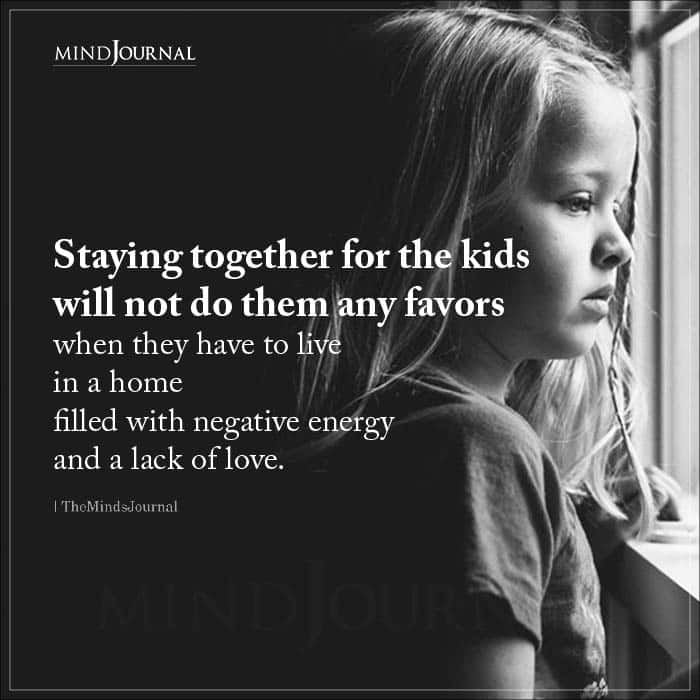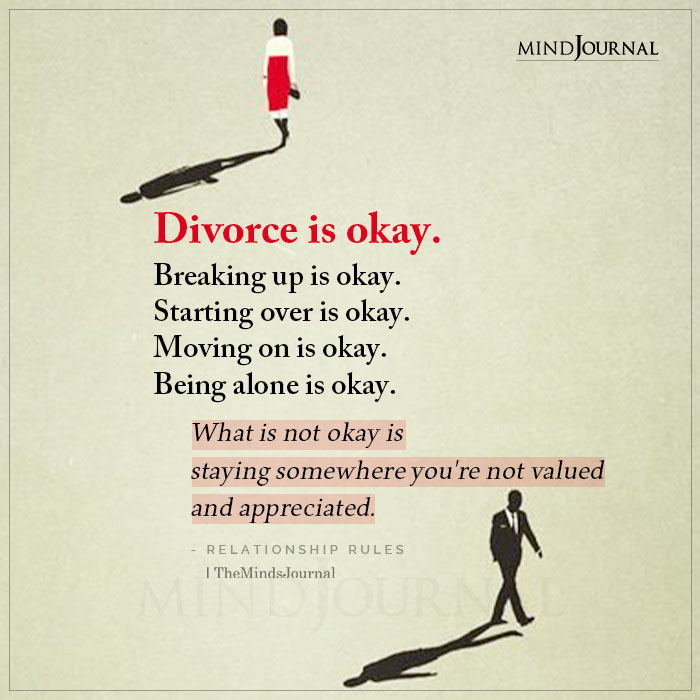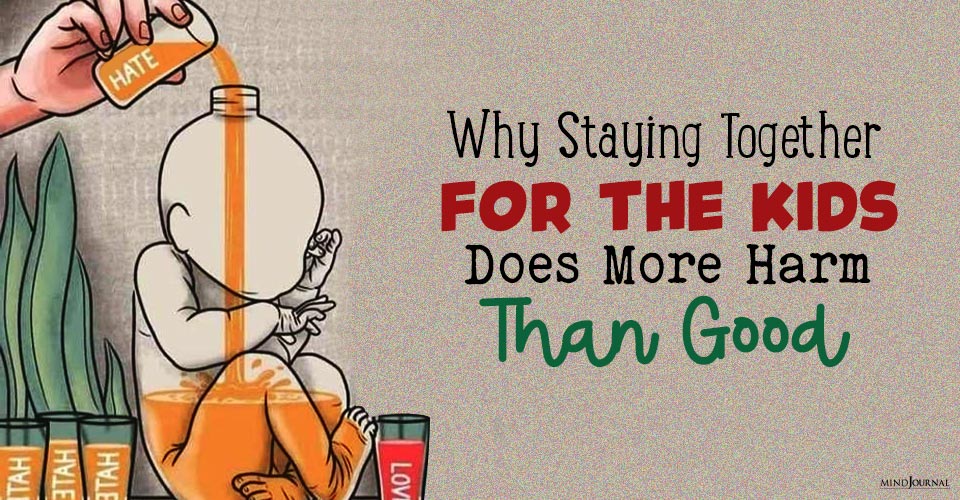Are you in an unhealthy and unhappy marriage, but you are staying together for the kids because you are scared it will emotionally scar them and cause them a great deal of pain?
Five words: Staying together for the kids. Well-meaning. Shows good parenting. Gives the idea of kids-above-all, the way things should be in the Good Parent Handbook.
When we make the decision to have children we know they will always come first. Those five words then become our sense of responsibility, and our contribution to our family in times of trouble:
We will be good parents.
We will give you everything.
We will never hurt you.
But what if our relationship as partners isn’t working? What if it’s unhealthy or abusive? What are we giving to our children if all we have to offer them as a couple is exhaustion, frustration, and secrecy? Are those five words really the right way to go?
Is staying together for the kids right, and does staying together for the kids work?
Related: Divorce Advice: How To Leave A Broken Home Before You Become Broken
Why Staying Together For The Kids Is Actually Worse For Them
Staying together for the kids. For years, those five words haunted me. While the narrative of domestic abuse has spun an idea that victims of abuse know it’s happening because it’s – obvious, the fact is: that abuse is often a slow-moving process that sinks in over time.
It has certain warning signs, but they’re easy to miss or mistake for something else. Oftentimes, victims of emotional, verbal, and physical abuse simply want things to be “normal” and will work hard to save a relationship even if it’s harming them.
I’ve been there. I was there for a long time. Until one day I asked myself, “If you want the best for your kids and you’re staying in a relationship that’s unacceptable, then what lesson are you teaching them? What will they think is normal? Won’t this mean they will one day be prone to abusive people and situations?” The answer is yes. So I decided to stop pretending.

When the time came for us to tell our kids that we were going to temporarily separate, we asked other people how they did it, talked to our therapists, and read article after article about when to do it, where to do it, and how to frame it. And then, when we told them, my teenager said the most curious thing:
“I’ve seen this coming since I was seven.”
I’ve worked with young adults since I was a young adult. The more I work with them, the more I’m certain that they have a far better view of the real problems in their lives, especially their battling parents than most adults think they do.
Of course, my teenager saw it coming. I saw it. I was just voluntarily blindfolded, trying to make things “normal.” My teenager wasn’t.
Related: 5 Situations When Divorce Is The Best Parenting Decision You Can Make
Kids are natural sponges. They will soak up whatever’s around them. Like us, they became increasingly stressed, anxious, angry, and guilty as we kept spending more and more time on the weekends and weeknights trying to “work things out.”
They became nearly invisible during the last year before the separation. They seemed to have no needs. This is unhealthy and damaging.
To have no needs is to spend an hour trying to figure out the right way to ask for something they actually need. It’s staying quiet because they don’t think anyone wants to hear what’s on their mind. Once solid ground turns to a bog, and with every step, they wonder when the ground will give and swallow them up.
We thought telling them that we were separating would swallow them up, never knowing they’d already been swallowed by our problems for years.
An abusive marriage is a quiet and sneaky life that breeds quieter, sneaky lives.
Children living in abusive households are prone to shut up. And shutting up is not good. It leads to clinical anxiety and depression and feelings like guilt, fear, and isolation. It can take years of therapy to break free from the emotional and mental habits of being a child in an abusive home.
As a family, we got lucky. Our marriage is healing and our time apart led us to an understanding. Therapy helps. All of us. Anxiety and depression are regular topics around our dinner table alongside daily school stories and the philosophy of unicorns.
Our kids are no longer being swallowed by an unidentified object because we’ve acknowledged the object and given it a name.
If I’ve learned anything in my years working with young people, it’s that adults underestimate kids all the time. It’s one of our biggest talents and our most craven defense mechanisms.
We blow off teen emotions especially, as some sort of drama or call for attention, because if we adults pretend that teen emotions are merely dramatic attention-seeking, then we don’t have to take them seriously. We don’t have to acknowledge the bog.

In my new novel, Still Life with Tornado, the mother character asks her son why he can’t just pretend to have a good time on their family vacation. His reply?:
“Why pretend? Aren’t we doing enough pretending as it is?”
Kids are used to juggling/hiding/fearing/enduring mental health issues that need an ear, not a blind eye. They are used to adults pretending they’re on solid ground. Teen mental illness and mood disorders are not a cry for attention and they’re not drama.
Related: What To Do If You Have An Unhappy Marriage But Are Afraid To Leave
However we might wish it were otherwise, they’re real. If we continue to play “stay together for the kids,” the cost of our adult game of pretend is our children’s mental health. And that price is too high.
We will be good parents.
We will do our best.
We will listen to you.
We will no longer pretend.
Want to know more about why staying together for the kids doesn’t work? Check this video out below!
If you or someone you know is experiencing abuse, please visit Childhood Domestic Violence Associate or Love Is Respect.
Still Life with Tornado by A.S. King, $14.05, Amazon












Leave a Reply